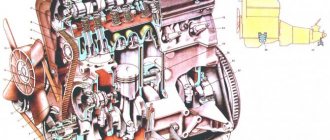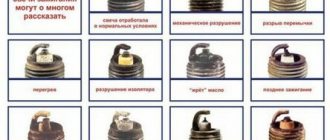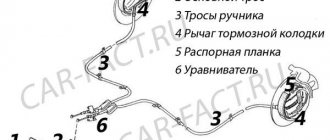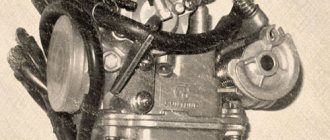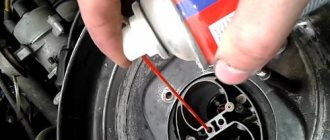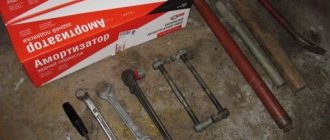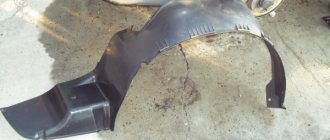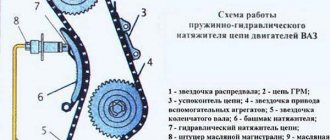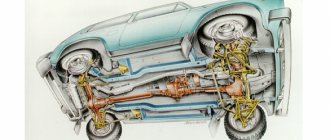On carburetor engines of VAZ 2108, 2109, 21099 cars, the recommended idle speed is 750-800 rpm. At the same time, they must be stable (without frequent misfires and “triples”). It is recommended to adjust the idle speed of engines with carburetors 2108, 21081, 21083 Solex once every six months or if problems arise with engine operation.
Preparatory work
Before carrying out the adjustment, at a minimum, it is necessary to make sure that the spark plugs, high-voltage wires, the distributor cap, the “slider” are in good condition, that the ignition timing is set correctly, that no foreign air is being sucked into the carburetor, and that the fuel pump is in good working order.
In addition, you should warm up the engine to operating temperature (80-90 degrees) and fully open the carburetor air damper, pushing the “choke” handle all the way.
It is not necessary to disconnect and plug the vacuum supply tube from the carburetor to the vacuum ignition timing regulator. Although, after adjusting the idle speed, you can remove it from the fitting on the vacuum regulator housing and check whether there is a vacuum in it when the engine is idling. At correctly adjusted speeds, there should be no vacuum there or it should feel very light.
Tools required for adjusting idle speed
Fine-tuning the idle speed is carried out using a gas analyzer, but not everyone has one. Therefore, it is advisable to have a separate device - a tachometer. If it is not available, you can use the tachometer built into the instrument panel (available on all VAZ 2108, 2109, 21099). You will also need a thin slotted screwdriver.
Adjusting the engine idle speed
Let's start the engine. We turn on the high beam headlights and the heater.
— The simplest way to adjust the idle speed of an engine with a Solex carburetor (2108, 21081, 21083) is to rotate the fuel mixture “amount” screw.
Counterclockwise the revolutions decrease, clockwise they increase. When the screw rotates, its tip acts on the lever of the throttle valve axis of the first chamber of the carburetor and thereby either opens the throttle valve of the first chamber of the carburetor, or, conversely, closes it. Because of this, the air flow passing through the first chamber and the vacuum in the CXX channel increases or, conversely, decreases. Thus, the “quantity” screw regulates the volume of fuel entering the engine cylinders. Accordingly, the engine idle speed will either increase or decrease.
The image shows the screw for adjusting the “quantity” of the fuel mixture of Solex carburetors (2108, 21081, 21083). The carburetor choke lever has been removed for clarity.
More precise tuning involves additional adjustment of the composition of the fuel mixture entering the engine cylinders.
The “quality” screw of the fuel mixture is responsible for this in the 2108, 21081, 21083 Solex carburetors.
To begin with, you can set the initial position of the “quality” and “quantity” screws of the carburetor. This is 3 full turns from the stop of the “quality” screw; the “quantity” screw should be set to the minimum crankshaft speed - 600-700 rpm.
— At the next stage, it is necessary to set the maximum idle speed, using only the “quality” screw of the fuel mixture.
Using a slotted screwdriver, gradually unscrew it from its socket until the idle speed reaches its maximum. It can be 1000 rpm or slightly higher.
— Next, use the “quantity” screw to set the speed to 900 rpm.
We achieve this by slowly rotating it counterclockwise.
— Using the “quality” screw, we set the idle speed at the required level of 750-800 rpm.
To do this, again slowly, wrap it clockwise.
If it is not possible to immediately achieve the desired crankshaft speed, we carry out the adjustment again.
The idle speed of the engine with a Solex carburetor has been adjusted.
— A second, more precise adjustment using both carburetor trim screws will lead not only to a stable and stable engine idle, but also to a decrease in the toxicity of exhaust gases.
— If “dips” occur when you press the gas pedal after adjusting the idle speed in this way, you should slightly turn the “amount” screw of the fuel mixture clockwise, thereby adding a little of the fuel mixture entering the engine cylinders from the idle system. After this, the engine speed will increase slightly, the limit value for engines of VAZ 2108, 2109, 21099 cars is 900 rpm.
— In some cases, it makes sense to modify the carburetor idle system. See “Modification of the idle system of Solex and Ozone carburetors.”
Five more articles on adjusting and tuning the Solex carburetor
Comparative car repair test
On all cars of the “ninth” family, the engines were equipped with domestically produced Solex carburetors. The only exceptions are later modifications, on which the manufacturer installed injection power units. Although far from being the most technically advanced vehicle, the Nine is still popular among car enthusiasts. This is largely due to the car’s maintainability and the relatively low cost of spare parts. In addition, a significant part of the restoration and adjustment work can be carried out by the owner himself, including adjusting the VAZ-2109 and 21099 carburetor, tuning it and cleaning it.
This article will consider only those operations that every car enthusiast can perform with his own hands. Don’t be intimidated by the large number of manipulations - follow the instructions, be careful, and setting up the VAZ carburetor will go no worse than in a service station. This way you can save time and reduce machine maintenance costs.
You can clean and adjust the carburetor for the VAZ nine yourself, in the garage
Preparing the carburetor for tuning
Before you begin adjusting the VAZ-2109 carburetor and other modifications of the model, you should ensure unimpeded access to its parts by removing contamination. If the car is used regularly, then the carburetor needs external flushing only in the case of adjustment procedures or to clean the moving mechanisms if they are heavily contaminated. External washing is carried out using a brush, a clean rag and a liquid that can dissolve oil (gasoline, kerosene or a special cleaning composition). This procedure does not involve removing the carburetor and consists of the following operations:
How to set up a VAZ-2109 and 21099 carburetor in a garage
According to the recommendations of experts, adjustment of the VAZ-21099 carburetor should begin with the float chamber. Using this procedure, it is possible to check and establish the optimal fuel level. You need to configure it by following the steps below step by step:
- Start the engine and turn it off after 2-3 minutes;
- After the air filter has been removed and the fuel hose has been disconnected, remove the carburetor cover (to do this, you need to unscrew five bolts). Place the lid on a clean surface with the floats facing up, being careful;
After removing the air filter, disconnect the fuel supply and remove the carburetor cap
- Using a caliper, determine the fuel level in the float chambers: the distance between the edge of the housing and the upper level should be 25.5 mm. If it turns out that the measurements do not comply with the standard, you will have to make an adjustment by bending the tongue of the float bracket and re-measuring the fuel level;
Additionally, you can check how the edges of the floats are located relative to the mating surface of the cover and, if they are not parallel, adjust by acting on the float brackets.
How to adjust the throttle valve actuator
Before you begin adjusting the damper itself, you should check the degree of cable tension. If it turns out that the cable is slack or its tension is too strong, then adjusting the VAZ-21099 carburetor involves starting to adjust the drive in such a way as to prevent the damper from completely closing. To do this, use a wrench set to “13” and tighten the end nut on the cable sheath. Next, use the same key to gradually loosen the locknut.
Now you can set the optimal distance between the carburetor and the tip of the nut. It should be taken into account that in the free position of the accelerator pedal, the damper must be completely closed. All that remains is to tighten the nut and the setting can be considered complete.
How to adjust the air damper actuator
First, the free movement of the thrust must be checked - this will require dismantling the air filter cover. The drive settings can be considered correct only if the air damper is fully opened in the “recessed” position of its handle. If deviations from the norm are detected, read the instructions on how to adjust the carburetor on a VAZ-2109 by performing a series of adjustments.
Throttle adjustment is an important part of the carburetor tuning procedure.
The drive setup process looks like this:
- Loosen the bolt that secures the rod to the lever. After this, you need to recess the drive handle and fully open the air damper, acting on its lever;
- Using pliers, pull the cable out of the sheath and tighten the fixing bolt;
- Next, you need to check how the damper closes when the handle of its drive is extended. Closing must occur completely, otherwise the adjustment operations will have to be repeated.
- The adjustment should be made until you achieve complete opening and closing of the damper in the extreme positions of the drive handle. Make sure that the lever does not come into contact with the cable jacket in any position.
So, at this stage, you have learned how to adjust the carburetor on a VAZ-2109 by setting the optimal operating position of its throttle and air dampers. Now let's move on to adjusting the starting device and idle speed.
Self-adjustment of the starting device
The most precise adjustment of the starting device by setting the values of the starting gaps requires removing the carburetor from the car. But first you need to make sure the integrity of the trigger device diaphragm. To do this, unscrew the four bolts, remove the cover and inspect the diaphragm. If it is suitable for further use, you can continue to make adjustments, otherwise the part will have to be replaced.
Below is a list of operations performed one by one, which describes how to adjust the VAZ-21099 carburetor by adjusting the starting device:
- First you need to close the air damper by turning its lever;
- Using a screwdriver, press down the starter rod;
- The gap formed between the chamber wall and the damper must be measured, and then its value must be compared with the calibration data (indicated by the manufacturer individually for each carburetor model and car);
- If the received data does not correspond to the nominal value, adjustment should be made. The locknut, which is located on the accelerator pump housing, should be loosened and the adjusting screw should be turned with a screwdriver until the required clearance is established;
- Now, having closed the air damper, it is necessary to measure the clearance of the throttle valve of the first chamber. Check the obtained data with the calibration table. If necessary, set the desired gap value by turning the damper adjusting screw.
It is likely that at this stage the adjustment of the VAZ-2109 carburetor can be completed. If you need to adjust idle speed or improve fuel consumption, you can read the relevant guide below.
Adjustment (step by step)
The problem with carburetor repair and adjustment is that the process must be carried out in conditions of cleanliness and maximum care. The HRV can malfunction even due to small specks in the tubes. Nevertheless, car owners can configure the control unit themselves.
What you will need
The adjustment process does not involve removing the carburetor; everything is done live. To work, you will need a flat table and a clean piece of light-colored fabric. We cover the table with fabric and place it next to the hood of the car. We lay out the necessary tools on the table: keys, pliers, Phillips screwdriver, flat screwdriver, ruler.
A vacuum cleaner and car air compressor may also be needed. A book on repairing a VAZ 2109 with a description of the components of the control unit, so that you can look there if necessary.
Below we will describe the process of adjusting the fuel level in the float chamber and setting the idle speed in stages.
Adjusting the fuel fluid level in the float chamber
There is no point in talking about fuel economy if the gasoline level is higher or lower than normal. To return to normal consumption, it is necessary to carry out a number of manipulations:
- After unscrewing the nut and opening the clamps, remove the cover of the filter mechanism housing and pull out the filter.
- Unfasten the EMG wire and hoses going to the carburetor.
- Loosen the 5 screws of the HRV cover and remove it.
- Lower a ruler to the bottom of the HRV chambers to determine the liquid level. If the measurements are 25-26 mm, then everything is normal and no adjustment is needed. If it is higher or lower than normal, we carry out further manipulations.
- Turn the removed lid over with the floats facing up and place it on the table.
- Adjust the floats by tightening the fasteners.
- Important rules for setting floats must be observed. They must be installed parallel to each other and vertically without distortion.
- Measure the gap between the floats and the gasket; it should be 2 mm. Otherwise, bend the tongue that acts on the support needle.
- Final stage. Identify the working stroke of the floats. If the floats are raised all the way up, the distance should not be more than 15 mm. A similar size should be achieved by bending the tabs.
Idle adjustment
In case of malfunctions of this kind, the engine runs intermittently at low speeds. You can also do the procedure yourself:
- Warm up the engine, then turn off and let it cool.
- Remove the filtration part of the heater and unscrew the EMG valve.
- Turn on the engine.
- Plug the idle air passage with your hand and apply the gas in this manner several times.
- Turn off the engine
- Blow out the EMG with a compressor, clearing it of dust and debris.
- Install all parts in place.
- Carry out the last manipulation to control the quality of work. To do this, you need to start the engine again. If the idle speed begins to work normally, it means the adjustment was successful.
More accurate adjustments can be made using special equipment - a gas analyzer. With its help, you can achieve not only high-quality adjustment of mechanisms, but also achieve greater environmental friendliness of the vehicle. However, such a unit is rare.
You can make the adjustment without this device, following the instructions. CU tuning depends on the car owner’s care and attention to the unit.
Signs of a Solex carburetor malfunction
Before adjusting the carburetor on a VAZ 2109, you need to familiarize yourself with the associated faults so as not to repair the unit just like that.
So, the reason after which the VAZ 2109 carburetor is adjusted is considered:
Fuel mixture too rich. Experienced auto mechanics know that for an ideal ratio of fuel and air, a value of 1 to 15 is required. This means that for the combustion of 1 kg of fuel, 15 kg of air are needed. If the mixture is called rich, it means that the fuel level is higher than the nominal level.
Symptoms: the engine is difficult to start, black smoke from the exhaust pipe, spark plugs with black soot and lumbago in the exhaust system. The fuel supply system quickly becomes clogged.
The following signs can be called a consequence of the previous ones and this is:
- Unstable idle speed;
- Increased fuel consumption;
- Deterioration of starting properties;
- Reduced engine response.
The operating principle of the carburetor and fuel supply system forces car owners to perform such a procedure as adjusting the VAZ 2109 carburetor at least once every six months. The mechanism on a car with a carb needs to be lubricated once a month, unlike a car with injection, which has injectors. Everything is extremely easy to adjust.
Design and principle of fuel supply
The VAZ 21099 (Solex) two-chamber carburetor consists of 2 parts: the main body and the cover. The cover contains an electromagnetic valve with an idle jet and a cold start system, which was sometimes equipped with a heating device. A float with a needle or ball valve is attached to the bottom of the lid, and 2 brass tubes with jets at the ends come out from there.
The main body of the carburetor is equipped with the following devices:
The idle speed adjusting screw supports the primary chamber damper and is equipped with a plastic handle. The screw that controls the enrichment of the fuel mixture is hidden in a deep well made in the “sole” of the housing. A diagram of the lower part of the unit is shown in Figure 1.
Now about the functions performed by each system:
- The spring-loaded cold start flap in the closed position ensures the supply of a rich mixture. If there is a bimetallic spiral, it opens automatically as it warms up; without it, it opens manually.
Reasons for failure of the VAZ 2109 carburetor
The Solex carburetor is a very sensitive device, which contains a large number of small channels. When a huge amount of low-quality fuel passes through them, you may encounter the fact that they become clogged with impurities and stop functioning.
The first thing that may immediately become noticeable is a decrease in idle speed. In the future, the car does not start well and needs carburetor adjustment.
This procedure is divided into several stages:
- Removing the unit
- Disassembly and cleaning
- Assembly and installation
- Carb idle adjustment
↑
Idle speed setting
After setting the level in the float chamber, we assemble the carburetor and warm up the car engine to operating temperature. In this video, they will tell you and show you how to set the idle speed in a Solex carburetor, as well as the main reasons for its absence.
Next, we turn it off and carry out the following operations:
- Using a flat-head screwdriver, tighten the mixture quality screw until it stops (position 7).
- We turn it back from this position 4 - 5 turns.
When setting the idle speed, some problems may arise:
The engine does not slow down when the mixture screw is tightened (a lot of fuel gets into the idle channel and this screw cannot shut it off).
Causes:
- large jets installed;
- the solenoid valve is not tightly screwed in, and fuel is sucked past the nozzle;
- deformation of the nozzle seat or itself.
So, for example, if the engine stalls when removing the wire from the solenoid valve, this means that the jet is installed too large.
Removing, disassembling and cleaning the carburetor VAZ 2109
If all of the above symptoms are detected, you can begin to remove and disassemble the carburetor. On a VAZ 2109, repairing a Solex carburetor is possible using a repair kit. It is recommended to purchase a repair kit in advance to immediately replace all gaskets, jets and valves. The table contains data on jets and all necessary valves. The machine must be stationary. When sorting out the parts, the most important thing is not to lose anything.
To remove and configure the device, you need to open the hood and disconnect all the hoses from it. They are mounted on clamps, so it is recommended to stock up on a screwdriver in advance. The next stage is the cable for driving the gas pedal and air damper. Both elements can be removed quite easily. After this, remove the chip from the idle speed economizer. Dismantling is carried out extremely carefully so as not to damage the contacts. Taking everything apart is even easier.
Recommended flow rates of pneumatic economizer jets for various operating conditions
| Operating conditions | Flow capacity cm³/min | Operating conditions | Flow capacity cm³/min |
| Light road conditions with heavy loads (economical adjustment) | 60 | Average road conditions |
You can now remove the four housing nuts that hold the carburetor to the intake manifold. If it is difficult to remove, you can pry it out with a thick screwdriver. Clog the manifold with a rag to prevent foreign particles from getting inside and clean the seating area of any remnants of the old carburetor gasket.
The carburetor itself consists of several elements:
- Top cover
- Bottom cover and float chamber
- Throttle valve block
First of all, the top cover is removed. At the same time, the condition of the needle valve and the condition of the float are checked. The valve should move without jamming and also easily return to its original position. You can immediately check the operation of the accelerator pump drive. All connections should turn easily. The operating principle of many mechanisms is very simple, and they must stand level. It is configured after assembly.
Now you need to separate the throttle body from the bottom cover. Everything is held in place with bolts, so a screwdriver will suffice. Once all components are completely disassembled, they need to be treated with throttle body cleaner or regular gasoline. Parts should be wiped with dry rags.
Installation and assembly of the VAZ 2109 carburetor
After cleaning all the elements, you can assemble it. Check the clearances in the throttle valve block in advance and set them to the nominal values. For each type of unit, you can find all calibration data in reference books. Instead of old gaskets, it is recommended to immediately install new ones to avoid repeated disassembly after two weeks of operation. Installation of parts is done carefully.
Replace the needle valve if necessary. A faulty valve can negatively affect fuel consumption, as it backs up and allows a huge amount of gasoline to pass through the channel cross-section.
It is recommended to lubricate the damper drives, levers and rods with Seledol or Litol 24. It is not recommended to use this lubricant in an environment that comes into contact with gasoline. The grease is suitable only for external parts, such as the plastic joints for the carburetor rods. They may not stand.
The top cover is installed last and only after adjusting the level in the float chamber.
What to do with increased consumption
Before you tightly grasp the carburetor, be sure to make sure that the other systems are in good working order - the spark plugs are in working order, the high-voltage wires do not break through to ground, and there is compression in the engine cylinders (the minimum value for the VAZ 2108 is 11 Bar). Unscrew the spark plugs and check the condition of the electrodes.
Light brown is the correct color for the electrodes on the spark plugs
The most unpleasant problem is an increase in fuel consumption, which occurs for the following reasons:
- the economizer diaphragm is worn out;
- the main air jet or channels inside the unit are clogged;
- the needle valve, which limits the flow of fuel into the float chamber, does not hold;
- jets of unknown origin from a repair kit were installed.
Location of the economizer cover
To check the diaphragm, remove the air filter housing (the cover is secured with 3 10 mm nuts, the housing with 4 8 mm nuts). On the left wall of the carburetor in the direction of travel of the car, find a triangular economizer cap screwed with 3 screws, unscrew them with a Phillips screwdriver. Underneath there is a spring-loaded membrane that needs to be checked and replaced if necessary.
Removing the filter on the figure eight
To eliminate other causes, you will have to remove the top cover of the Solex by disconnecting the starter cable and unscrewing the 5 fastening screws with a Phillips screwdriver. Then follow the instructions:
- Unscrew the air jets, remembering where each one should be. Fuel jets are hidden under them in the wells; unscrew them with a thin screwdriver and pull them out with a toothpick. Blow through the calibrated holes thoroughly.
- Using a blower, suck the gasoline out of the float chamber along with the dirt. Fill all channels and diffusers with the product from an aerosol can, wait for the time indicated on it and carefully blow out the carburetor without removing it from the car.
- Take the removed cover of the unit, turn it with the floats up and try to blow into the fuel supply pipe, plugging the pressure release fitting with your finger. If air passes through, replace the needle valve as it will also allow gasoline to pass through unhindered.
- If you replaced all the jets before increasing the flow rate, feel free to unscrew them and throw them away, and return the standard ones to their place.
- Before assembly, make sure that the floats do not touch the walls of the chamber; if necessary, carefully bend them.
- Reassemble the Solex in reverse order and begin adjusting.
To remove the top cover of the Solex you need to unscrew 5 screws
Do-it-yourself carburetor float chamber level adjustment
Diagram of the float chamber with installation parameters: 1 - float; 2 - tongue; 3 - gasket; 4 - cover.
The level in the float chamber is necessary for smooth operation of the carburetor. A level that is too high will increase the fuel supply, while an insufficient level will reduce the throttle response of a carburetor engine, since the level will not be able to rise in time.
To adjust the level in the chamber, you need to turn the top cover over and bend the float as far as the antennae allow. The distance between the bottom corner and the cover should be 20 mm. If not, bend the tabs and install the top cover. This do-it-yourself adjustment of the VAZ 2109 carburetor is considered nominal. The principle of action here is simple.
Methods for adjusting the carburetor
There are 2 main settings - the amount of the fuel mixture and the adjustment of the carburetor float chamber.
These adjustments are made when the engine is unstable or when the fuel system is not working properly:
- The engine does not start well;
- Low RPM power;
- Incorrect operation when accelerating.
These factors indicate improper operation of the power system.
Adjusting the choke or trigger
Install the carb, but do not install the air filter. Pull the choke out completely and close the valve. In this position, you need to adjust the air damper cable.
Try pulling out and removing the choke several times. The damper should open and close completely without jamming. If everything is done correctly, you can install the air filter in place, connect all the hoses and carburetor drives. It's time to start adjusting the idle speed of the VAZ 2109. Don't forget about connecting the EPHH.
How to set up the carburetor correctly on a VAZ 2109?
The nominal speed of the VAZ 2109 engine should correspond to 750-800 rpm. Adjusting the XX carburetor is necessary to economically maintain engine operation while parked and to warm up as quickly as possible before driving. Without this, the device will not work. Table from those. carburetor characteristics does not have such data. This must be done according to the following instructions, which contain the XX norm. The results and adjustment scheme are stable speeds.
This procedure is carried out if there are problems with the engine or once every six months in accordance with the regulations on technical maintenance of the VAZ 2109. You only need to spend 3-4 minutes on it. The engine warms up to operating temperature using choke or using the accelerator pedal. Next, remove the choke and fully tighten the quality screw. Most likely, the engine will stall. Now the screw is unscrewed exactly three turns and the engine starts again.
Using the quantity adjusting screw, the speed is set to 650-700 rpm. Now turn the quality screw until you get the highest possible idle speed. Again we set the number of revolutions equal to the nominal one. Now we need to rotate the quality again until we get maximum speed. You can regulate this way for a long time.
Now turn the quantity up to 800 rpm. This adjustment is considered correct. If this was not achieved the first time, you need to repeat the procedure again. It is worth recalling that the entire procedure is performed with the headlights on low beam and the stove operating at maximum mode. This is due to the fact that when the voltage drops, the speed drops, so when using these consumers, the speed should be nominal, and when turned off it should increase slightly.
The quality and quantity screw on the carburetor of the Lada 2109 car is located at the rear of the unit. In this regard, adjustment becomes more complicated. Although, it becomes more difficult to regulate, but not as often as on a Zhiguli.
